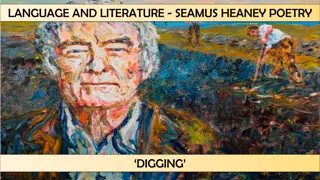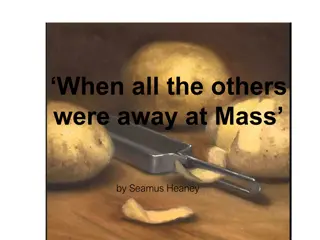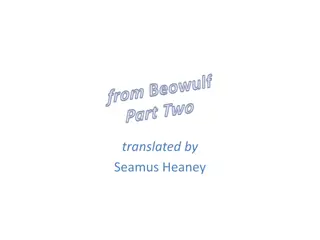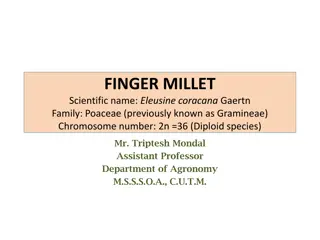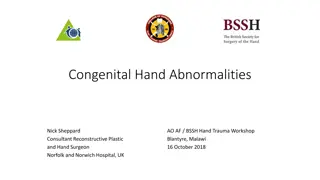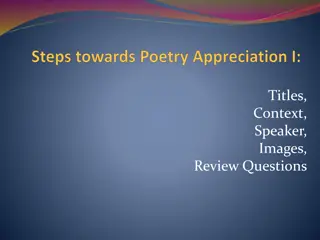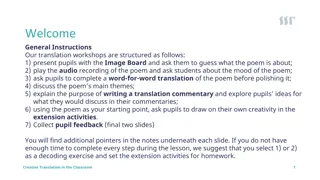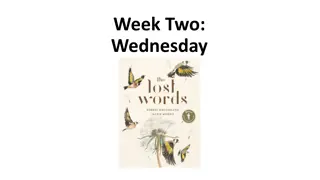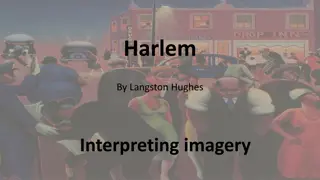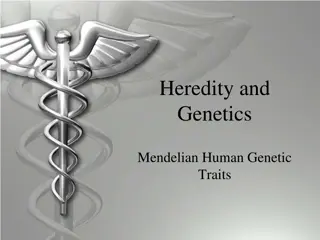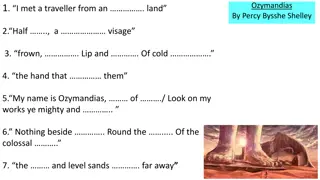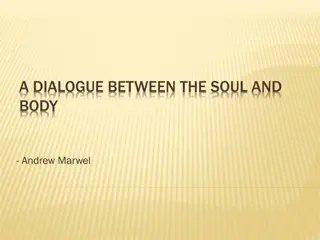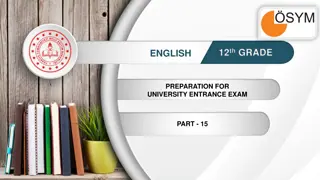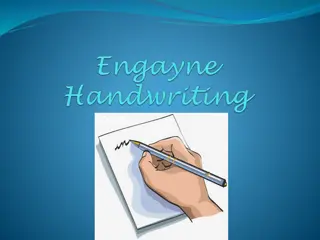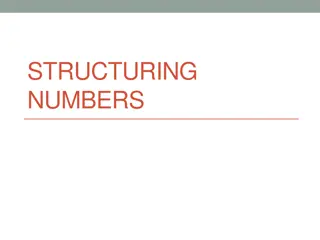Exploring Seamus Heaney's Poem: Between My Finger and My Thumb
In Seamus Heaney's poem, "Between My Finger and My Thumb," the speaker reflects on his father and grandfather's connection to the land through the act of digging. The vivid imagery captures the physicality and tradition of manual labor while exploring themes of inheritance and identity. Through descriptions of handling a spade, planting potatoes, and the smell of the earth, Heaney crafts a nostalgic tribute to the strength and perseverance of his ancestors.
Download Presentation

Please find below an Image/Link to download the presentation.
The content on the website is provided AS IS for your information and personal use only. It may not be sold, licensed, or shared on other websites without obtaining consent from the author. Download presentation by click this link. If you encounter any issues during the download, it is possible that the publisher has removed the file from their server.
E N D
Presentation Transcript
Between my finger and my thumb The squat pin rest; snug as a gun. Under my window, a clean rasping sound When the spade sinks into gravelly ground: My father, digging. I look down Till his straining rump among the flowerbeds Bends low, comes up twenty years away Stooping in rhythm through potato drills Where he was digging.
The coarse boot nestled on the lug, the shaft The coarse boot nestled on the lug, the shaft Against the inside knee was levered firmly. Against the inside knee was levered firmly. He rooted out tall tops, buried the bright edge He rooted out tall tops, buried the bright edge deep deep To scatter new potatoes that we picked, To scatter new potatoes that we picked, Loving their cool hardness in our hands. Loving their cool hardness in our hands. By God, the old man could handle a spade. By God, the old man could handle a spade. Just like his old man. Just like his old man.
Squat = little Snug = tight Rasping = rough Spade = hand shovel
My grandfather cut more turf in a day Than any other man on Toner's bog. Once I carried him milk in a bottle Corked sloppily with paper. He straightened up To drink it, then fell to right away Nicking and slicing neatly, heaving sods Over his shoulder, going down and down For the good turf. Digging.
The cold smell of potato mould, the squelch The cold smell of potato mould, the squelch and slap and slap Of soggy peat, the curt cuts of an edge Of soggy peat, the curt cuts of an edge Through living roots awaken in my head. Through living roots awaken in my head. But I've no spade to follow men like them. But I've no spade to follow men like them. Between my finger and my thumb Between my finger and my thumb The squat pen rests. The squat pen rests. I'll dig with it. I'll dig with it.
Between my finger and my thumb The squat pen rests; snug as a gun. This poem begins with the camera completely zoomed in. Heaney gives us an image of a hand (specifically the fingers) holding a pen. But the focus is all on the pen. The hand doesn't hold the pen, the pen rests in the hand. Who's the subject now, hand? Then the speaker throws a startling simile at us. In his hand, the pen feels like a gun. While it doesn't quite lookthe same, both holding a pen and a gun require your finger (on the trigger if you're holding a gun) and your thumb, of course. Oh, and both pens and guns are tools, albeit for totally different jobs. What's so weird about this is that we typically think of writing as something peaceful and contemplative, which is what the word "snug" makes us think of snuggled up, tight, secure.
Under my window, a clean rasping sound When the spade sinks into gravelly ground: Someone outside is digging, using a spade, or shovel, and it's making a rasping sound when it cuts into the earth. Why rasping? Well, the shovel probably makes a horrible, grating sound when it enters the ground because the shovel is skimming against lots of tiny stones that make up the "gravelly ground." "Clean" and "rasping" is another interesting pairing of words. "Rasping" and "gravelly" work well together because they're similar in meaning rasping means coarse and gravel actually is coarse. "Clean" however, would much more likely make us think of something smooth and polished. So how can a sound be both coarse and smooth?
My father digging. I look down Oh, so it's the speaker's father who is doing the digging. Okay, good to know. So far, there have been three different tools mentioned: the pen, the gun, and the spade. When we step back, we see the speaker (the son) indoors, pen in hand, and outside, the father works digging at the rocky soil. Those are two very different activities.
Till his straining rump among the flowerbeds Bends low, comes up twenty years away Our speaker watches from the window as his dad bends, digging among the flowerbeds. The father seems to be working pretty hard. Heis"straining," after all. Flashback alert! In line 7, when the speaker's dad comes up from his gardening crouch (you know, that squatting position you're in when you're in the garden super attractive), the speaker imagines him twenty years away, which we take to mean twenty yearsago. But before we jump back in time, take note of what his father is digging here: flowerbeds. That information might come in handy later.
Stooping in rhythm through potato drills Where he was digging. So what was happening twenty years ago in our speaker's mind? His father was digging potatoes, that's what. Potato drills, by the way, are evenly spaced rows of potatoes in a field. Nothing too confusing there. But it also refers to the act of drilling into the earth to make a hole in which you plant the potato. It seems the rhythm of the father bending and rising in his garden has sparked this flashback it's the same pattern he used to follow in the potato drills, dipping down into the ground, then coming back up.
The coarse boot nestled on the lug, the shaft Against the inside knee was levered firmly. Just when you thought you were done, it's still tool time, friends. The coarse boot belongs to the father, and it's probably coarse because it's a beat-up old work boot. A lug refers to the top of the blade of the spade, which sticks out on either side of the shaft, or handle. Stepping on the lug and putting all your weight on it helps sink the tool into the ground, so you can dig your hole. When he says the shaft is levered firmly on the inside of his father's knee, it just means that he's got a good hold on it, so he won't lose his balance when he digs the spade into the earth.
He rooted out tall tops, buried the bright edge deep The "he" still refers to the father, and we're still in that memory from twenty years ago, which we can tell because the speaker is still using the good ol' past tense. The speaker's old man is still working on the potato drill. "Rooted out" means he found the potato tops by digging them up. The "bright edge" is the edge of the shovel's blade, and our speaker probably calls it bright because it's made of some sort of metal, as most spades are.
To scatter new potatoes that we picked, Loving their cool hardness in our hands. Up until this point, our speaker was talking about his father as if he were alone, but "we" pops up in Line 14. Looks like the father and son are doing this work together. Or at the very least the son is hanging around while the father works. The "cool hardness" refers to the way the potato feels when it's pulled from the earth, almost like a rock. Note, too, that again the speaker is talking about the way something feels in his hand, only this time instead of a pen, it's a potato.
By God, the old man could handle a spade. Just like his old man. It seems our speaker's father was really good at digging up these potatoes, and apparently his grandfather wasn't too shabby in the fields either. The speaker seems to think the ability to work with one's hands is a good thing; he's paying his father and grandfather a compliment. "By God" is an exclamation (without the exclamation point). It grabs our attention and shows us just how much enthusiasm and admiration our speaker has for his father and grandfather's skill. Not only does work seem important to our speaker, but tradition, too or work as partof the family tradition. He comes from a long line of diggers, and he seems pretty proud.
My grandfather cut more turf in a day Than any other man on Toner's bog. Our speaker is reaching even further back into the family history to the time when his grandfather dug for turf, and evidently, was very good at it. Is there anything these men can't do? A bog is a patch of wet, muddy ground, covered in peat, or turf, which forms the grassy top layer. The peat makes for a great fuel and fertilizer, so Irishmen used to (and some still do) harvest the peat by cutting it from the bog and saving it for later use.
Once I carried him milk in a bottle Corked sloppily with paper. He straightened up Our speaker enters the scene with his grandfather now, and he's probably quite young in this memory. It looks like the speaker takes him fresh milk with paper shoved in the top as a stopper while his grandfather works in the bog, and his grandfather takes a brief break from all his hard work to have a sip.
To drink it, then fell to right away Nicking and slicing neatly, heaving sods Got milk? The grandfather certainly does. But he only allows himself a quick break before getting right back to business. Heaney describes how he cuts into the ground with his spade "nicking and slicing neatly." It seems as though it's not just hard labor, but takes a good amount of technique, too. The grandfather's technique and efficiency are similar to what we saw from the father earlier in the poem.
Over his shoulder, going down and down For the good turf. Digging. The "good turf" he's after is the nutrient rich stuff that's good for using as fuel or fertilizer. Check out the way Heaney puts it: "down and down Digging." His phrasing sort of reenacts the steady and difficult process. And just in case you didn't notice, the grandfather is digging. Always digging. Both the father and the grandfather seem to be pretty hard-working, tough men, and these lines continue to emphasize that fact by calling our attention to the grandfather's constant effort.
The cold smell of potato mould, the squelch and slap Of soggy peat, the curt cuts of an edge These lines are the first half of a sentence that will be completed in line 27, so for now, let's just think of them as a list. But of what? Of the smells and sounds of digging for potatoes and peat that's what. He brings up the smell of potato mold, the sounds of the peat bog, and the cuts of the spade as it digs down into the earth.
Through living roots awaken in my head. All the things he just listed in lines 25-26 pop up in his head. That sounds simple enough after all, he's watching his father dig, so why not remember these things? But what's the deal with the phrase at the beginning of the line "through living roots"? As it turns out, this line has a whole lot more going on below the surface (pun intended). Of course he's talking literally about the roots of a plant flowers, potatoes, etc. But you could also definitely read "roots" to mean the roots the speaker has to his father and grandfather's work as in origins, or heredity, or tradition. They are "living roots" because the memories are alive in him, our speaker, as he watches his father in the flower bed.
THANK YOU


